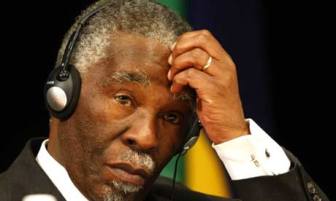South Sudan questions competence of Mbeki’s mediation
April 2, 2012 (JUBA) – The government of South Sudan on Monday voiced frustration with the African Union High Level Implementation Panel (AUHIP) led by former South African president Thabo Mbeki and suggested that the Intergovernmental Authority on Development (IGAD) should step in the mediation process between Juba and Khartoum on post-independence issues.

Along with security issues, the two countries have yet to resolve many other contentious items that resulted from South Sudan’s independence including oil transit fees, citizenship, external debt and water.
The Southern Sudanese delegation was led by the Office of the President minister Emmanuel Lowilla and Information minister Barnaba Marial Benjamin in what could be seen as a bid by Juba to sideline Mbeki’s panel.
South Sudan’s information minister said his government was unhappy not only with the AU report to the UN Security Council about the recent border clashes but also with the overall mediating process.
Speaking to reporters Benjamin said that IGAD should “take over mediation” if the AU process cannot succeed.
The seven-nation IGAD negotiated the 2005 Comprehensive Peace Agreement (CPA) that ended a decades-long civil war between north and south Sudan. That deal gave Southern Sudanese the right of self determination which they exercised in January 2011 and overwhelmingly picked independence from the Arab-Muslim dominated north.
The “Sudanese army until today continues to bomb our areas yet the African Union does not see it as aggression,” Benjamin complained.
AUHIP was originally in October 2009 by the Pan-African body to implement recommendations drafted by the African Union Panel on Darfur (AUPD) also led my Mbeki.
Even though the core of AUHIP’s mandate related to finding a solution to the Darfur conflict, the committee slowly shifted its focus and chose instead to concentrate on mediating between Juba and Khartoum as the latter rejected key proposals he presented on Darfur.
But the panel has had little success in making any tangible breakthroughs despite more than two years of mediation. It has also suffered major setbacks including Sudanese president Omer Hassan al-Bashir’s decision to scrap an agreement Khartoum signed on South Kordofan.
Also a planned summit between Bashir and his southern counterpart Salva Kiir to sign AUHIP brokered deals on borders and nationality were suspended as a result of the battles on the borders.
Since last year, Sudan Armed Forces (SAF) has fought Sudan People Liberation Movement North (SPLM-N) in the border states of South Kordofan and Blue Nile states, displacing thousands of civilians and causing a food crisis according to United Nations agencies.
Khartoum persistently accuses Juba of providing support to its former comrades who are seeking to topple the Bashir regime
The two countries now accuse each other of triggering the fighting that broke out last month. South Sudan claimed that SAF bombed their oil fields in the Unity State, triggering their entry into oil-rich region of Heglig in South Kordofan, while Sudan claims that it only responded to SPLA aggression.
“Who does not know that Sudan armed forces have actually been carrying out repeated attacks on areas inside territories of the republic of South Sudan?”, Benjamin asked.
Benjamin said that the SAF bombing campaign was designed to ensure that Bashir’s planned visit to Juba is cancelled as he was due to sign framework agreements that many in the ruling National Congress Party (NCP) and right wing parties in Khartoum strongly opposed.
Sudan denies bombing South Sudan and claims Bashir’s trip was cancelled due to the SPLA’s attack on Heglig and alleged southern involvement in the fighting around Teludi, also in South Kordofan, where rebels are attempting to control the town.
Khartoum says that Southern involvement in South Kordofan demonstrates the influence the SPLM-N and their rebel coalition partners in the Sudan Revolutionary Front (SRF) have over the Juba government.
One of Khartoum’s main demands, in order for progress to be made on oil and other issues, is for Juba to officially denounce the SRF and commit to not supporting them.
Benjamin said since South Sudan stopped production, Sudan increased aerial bombardment of the disputed areas and organized ground attacks in late March which were repulsed by the South Sudanese troops. Despite that, he said that Juba is willing to receive Bashir.
He accused Sudan of trying scare away investors, including American and Chinese companies, in the oil-rich regions where there are plans to build oil refineries which he said will be operational in six to seven months. The oil refineries will help South Sudan process some oil to help meet local demand for the commodity, he said.
Echoing the words of South Sudan’s president, Benjamin said South Sudan remains committed to peace and would fight back only to defend its territorial integrity.
“We will not be dragged into a senseless war,” he said.
(ST)
